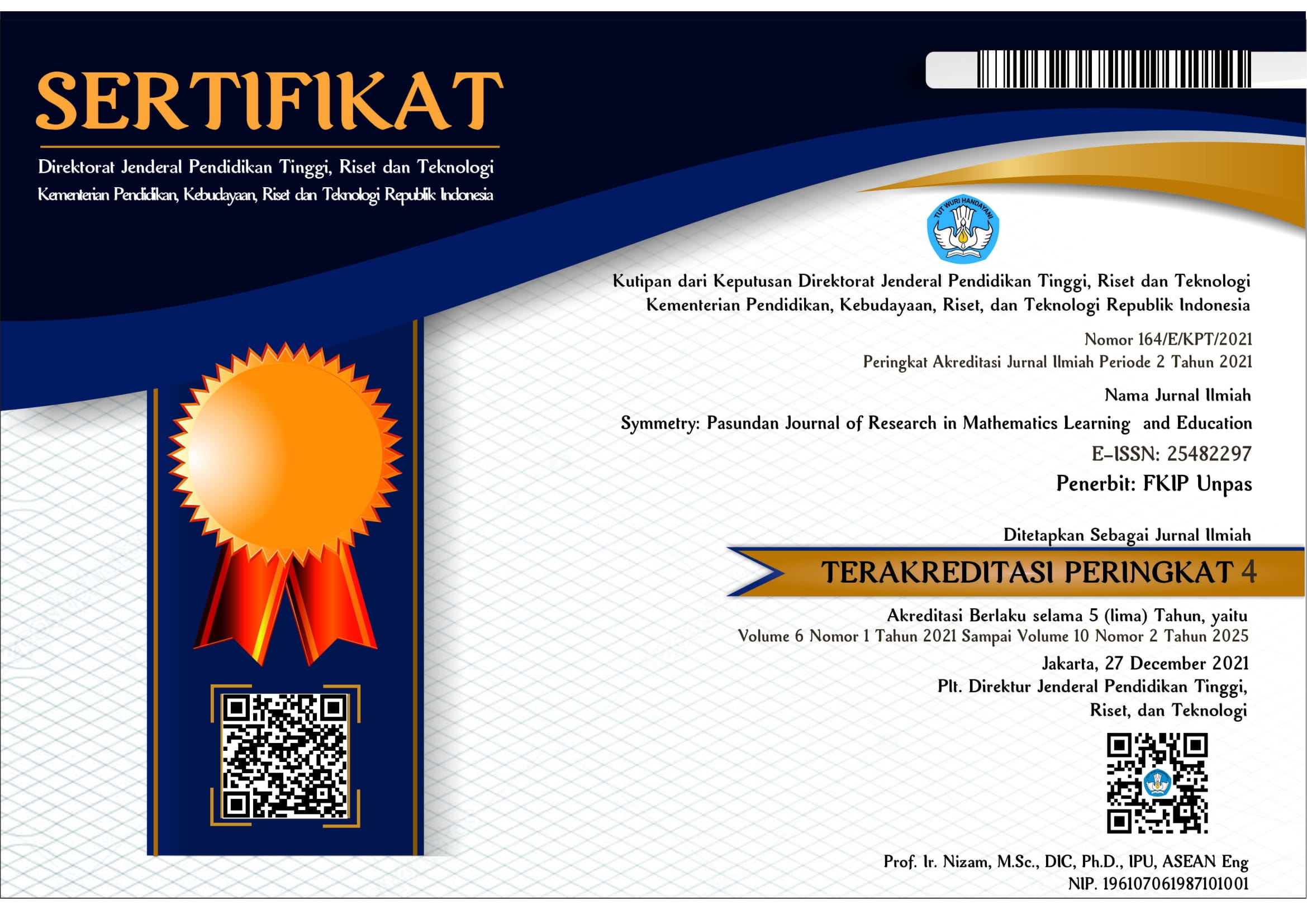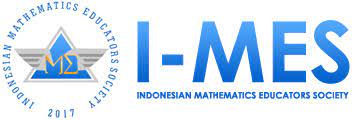PENINGKATAN KEMAMPUAN PEMECAHAN MASALAH MATEMATIS SISWA SMP MELALUI MODEL DISCOVERY LEARNING DENGAN PENDEKATAN PEMBELAJARAN REALISTIK
DOI:
https://doi.org/10.23969/symmetry.v9i2.21722Abstract
The purpose of this study was to analyze whether the increase in the mathematical problem solving ability of students who received the discovery learning learning model with a realistic learning approach was higher than students who received conventional learning models. The subjects in this study were students of class VIII MIPA SMPN 1 Gununghalu. The research sample used 2 classes, namely class VIII-A as the experimental class and class VIII-C as the control class. The method in this study was a quasi-experimental research design with a non-equivalent control group design. The instrument used in this research is a test description of mathematical problem solving abilities. The results showed that the increase in mathematical problem- solving skills of students who received the discovery learning model with a realistic learning approach was higher than students who received conventional learning models
Downloads
References
Andriani, M. (2013). Pembelajaran Matematika SD/MI, Bandung: Benteng Media
Dalyono. (2015). Psikologi Pendidikan. Jakarta. Bineka Cipta
Permendikbud No. 58 (2014, hlm 323) tentang kurikulum 2013
Masjaya, M., & Wardono, W. (2018, February). Pentingnya Kemampuan Literasi Matematika untuk Menumbuhkan Kemampuan Koneksi Matematika dalam Meningkatkan SDM. In PRISMA, Prosiding Seminar Nasional Matematika (Vol. 1, pp. 568-574).
Fisher, D., Yaniawati, R. P., & Mariani, M. (2019). Pendekatan saintifik berbasis e-learning untuk meningkatkan kemampuan berpikir kreatif matematis dan self-confidence. Jurnal Analisa, 5(2), 137-151.
Harahap, E. R., & Surya, E. (2017). Kemampuan pemecahan masalah matematis siswa kelas vii dalam menyelesaikan persamaan linear satu variabel.
Hendriana, H., Rohaeti, E. E., & Sumarmo, U. (2017). Hard skills dan soft skills matematik siswa. Bandung: Refika Aditama, 7.
Khotimah, S. H., & Asâ, M. (2020). Pendekatan pendidikan matematika realistik terhadap hasil belajar matematika siswa sekolah dasar. Jurnal Imiah Pendidikan Dan Pembelajaran, 4(3), 491-498.
Liando, M. A. J. (2021). Penerapan Model Pembelajaran Discovery Learning Untuk
Meningkatkan Hasil Belajar Siswa Mata Pelajaran Matematika. Edutik: Jurnal Pendidikan Teknologi Informasi dan Komunikasi, 1(6), 743-751.
Masjaya, M., & Wardono, W. (2018, February). Pentingnya Kemampuan Literasi Matematika untuk Menumbuhkan Kemampuan Koneksi Matematika dalam Meningkatkan SDM. In PRISMA, Prosiding Seminar Nasional Matematika (Vol. 1, pp. 568-574).
Mullis, I. V., Martin, M. O., Foy, P., & Arora, A. (2012). TIMSS 2011 international results in mathematics. International Association for the Evaluation of Educational Achievement. Herengracht 487, Amsterdam, 1017 BT, The Netherlands.
Ningsih, S. (2014). Realistic mathematics education: model alternatif pembelajaran matematika sekolah. Jurnal Pendidikan Matematika, 1(2), 73-94.
Fajrina, U. (2022). Pengaruh Pembelajaran Matematika Realistik Berbasis Etnomatematika Terhadap Kemampuan Pemahaman Konsep Matematika Siswa SMP/MTs (Doctoral dissertation, UIN Ar-Raniry).
Salirawati, D. (2012). Percaya diri, keingintahuan, dan berjiwa wirausaha: tiga karakter penting bagi peserta didik. Jurnal Pendidikan Karakter, 3(2).
Suhendri, H. (2012, November). Pengaruh kecerdasan matematis-logis, rasa percaya diri, dan kemandirian belajar terhadap hasil belajar matematika. In Prosiding Seminar Nasiona l Matematika dan Pendidikan Matematika UNY (Vol. 10).
Fajrina, U. (2022). Pengaruh Pembelajaran Matematika Realistik Berbasis Etnomatematika
Terhadap Kemampuan Pemahaman Konsep Matematika Siswa SMP/MTs (Doctoral dissertation, UIN Ar-Raniry).
Downloads
Published
Issue
Section
License
Copyright (c) 2024 Symmetry: Pasundan Journal of Research in Mathematics Learning and Education

This work is licensed under a Creative Commons Attribution 4.0 International License.
Hak Cipta sepenuhnya ditangan jurnal.



















